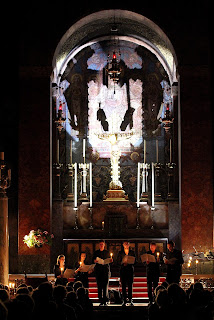 |
| Finbar Lynch and the Marian Consort photo - Robert Piwko |
Brighton Early Music Festival (BREMF) presented the premiere of Norburn's play on Sunday 3 November 2013 at St. Bartholomew's Church, Brighton. The work was essentially a monologue for Finbar Lynch playing Gesualdo, interspersed with music from The Marian Consort (Emma Walshe, Gwendolen Martin, Rory McCleery, Nick Pritchard, George Pooley and Christopher Borrett) supported by Jadran Duncumb (theorbo). But the result was far more the sum of its parts. Lasting just two hours (including interval), the play was mesmerising and magical. Directed by Karolina Sofulak, this was no rehearsed reading but a fully dramatic event.
Finbar Lynch is currently best known for his appearance as Monty in the ITV series Breathless. He has done a lot of work with both the Royal Shakespeare Company and the National Theatre but music lovers may remember him best as Oberon in Jonathan Kent's production of Purcell's The Fairy Queen for Glyndebourne.
The play takes as its subtitle The imagined testimony of Carlo Gesualdo, composer and murderer. Using the convention of an unseen observer (us) to whom Gesualdo talks, we hear him mulling over his life. He professes to remember little of the central event in his life, his murder of his first wife and her lover, caught in flagrante. But by the middle of part two, he gives us a thrilling recital of events, gory in its detail and gripping in its presentation. Finbar Lynch was mesmerising as Gesualdo, creating a character whom we could understand, if not love; recounting his loveless childhood, the early death of his mother, training for the priesthood, removal to the princely palace on the death of this older brother, disastrous wedding night and its terrible consequences, and his appalling treatment of his second wife.
But there is also his music, the intoxicating discovery of the musical life of Ferrara (we hear Luzzasco Luzzaschi's duet Cor mio, deh non languire from the Ferrarese court), his numerological theories which underpin the Tenebrae Responspories.
This could have been dry, but Lynch made Gesualdo all to believable and convincing, you really believed this man composed the music. And what music!
 |
| The Marian Consort and Finbar Lynch Photo Robert Piwko |
By the end of the piece, you felt you understood Gesualdo better and understood the way his music fitted into the man and his life. As the lights dimmed and the candles went out at the end of the magical performance of Gesualdo's Miserere mei, Deus we were at the end of a vividly involving evening.
 |
| Finbar Lynch - photo Robert Piwko |
The event showed what interesting and intelligent programming can be achieved by festivals. Not only did it continue BREMF's work supporting and showcasing young ensembles, in this case the Marian Consort, but it linked in nicely with the previous evening's Passion and the Princess. Both events touched on Gesualdo's visit to Ferrara and its musical importance; the one from the Ferrarese point of view, the other from Gesualdo's
Breaking the Rules deserves a far longer run, and I hope this performance catches someone's attention, the piece would certainly make a good film. And I could certainly like to encounter again Finbar Lynch's ruggedly sexy but intense and scary Gesualdo, and the Marian Consort's magical performance of his music, not to mention Norburn's imaginative weaving of all the various strands into a dramatic whole.
.
Elsewhere on this blog:
- WIN a copy of Music: The Definitive History our latest Competition
- BREMF - Passion and the Princess
- Imaginative programme - Francesco Meli in Liszt and Britten - CD review
- Vibrant and involving - Ashley Riches and Elizabeth Watts - London Song Festival
- Birth of the Symphony - Academy of Ancient Music - CD review
- Birthday celebration - Howard Blake & Benedict Kloeckner
- Special Occasion - Britten Canticles, Mark Padmore and Julius Darke - CD review
- Hot of the page - Rough for Opera with Kate Whitley and Amir Mahyar Tafreshipour
- Poise and subtle charm - Faure Melodies, Ailish Tynan and Iain Burnside - CD review
- Cool Passion - BREMF opening event
- Listening with new ears - Exaudi: Exposure 13
- Dramatic conviction - Donizetti: Belisario - CD review
- Home







%20as%20Leporello%20and%20Erik%20Tofte%20(back%20to%20camera%20in%20garnet%20shirt)%20as%20Giovanni%20-%20Don%20Giovanni.jpg)



No comments:
Post a Comment